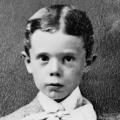Huey Long Official Website | Biography, Programs & Legacy (original) (raw)
HUEY P. LONG, JR. (1893-1935) was Louisiana's legendary populist Governor, U.S. Senator and favorite son.
Long transformed Louisiana politics and society during the Great Depression, launching a vast program of modernization and reform. Known as “the Kingfish,” Long was poised to challenge FDR for president on his “Share Our Wealth” platform when he was assassinated in 1935 at the age of 42.


Sen. Huey Long speaks to a crowd of 20,000 at the 1934 LSU-Vanderbilt game in Nashville, Tenn.
Courtesy of LSU Libraries Special Collections

Louisiana schoolchildren thank Gov. Huey Long for free textbooks that increased enrollment by 20%.
Courtesy of the State Library of Louisiana

Gov. Huey Long campaigns in Arkansas for Hattie Caraway, the first woman elected to the U.S. Senate.
Courtesy of LSU Libraries Special Collections

As governor, Huey Long signed scores of new laws to improve the lives of Louisiana's working people.
Courtesy of the Louisiana State Archives

Sen. Huey Long with some of the 60,000 pieces of mail he received weekly at his U.S. Senate office
Courtesy of LSU Libraries Special Collections
The Kingfish
Huey Long was known as "the Kingfish", a take-charge problem solver who delivered immediate relief to the suffering and powerless. As Governor, he used strong-arm tactics to break political gridlock and cut red tape. He took Washington by storm as the most outspoken U.S. Senator.
Life & Times
Share Our Wealth
Huey Long’s Share Our Wealth movement, launched in 1934 during the Great Depression, was a populist program aimed at reducing economic inequality. The plan sought to “share the wealth” of the nation more fairly and ensure a decent standard of living for all Americans.
Share Our Wealth
Long's Philosophy
Huey Long believed that government should protect and uplift its most vulnerable citizens and provide opportunity for everyone, regardless of race or class. He broke the monopoly on power held by the ruling elite and their corporate backers and transformed Louisiana politics.
Perspectives
A Lasting Legacy
Huey Long transformed the public's perception of the role of government in a democratic society. Some of our most cherished government programs — from social security to veterans benefits, student financial aid to public works projects — were causes championed by Huey Long.
Huey Long's Legacy
1893
1900
1911
1918
1928
1932
1934
1935
1893
Huey Pierce Long, Jr. born on August 30 in Winnfield, La.
1910
Huey Long expelled from high school for circulating petition
1910
Huey becomes traveling salesman
1913
Huey Long marries Rose McConnell
1914-1915
Huey Long attends Tulane University Law School for one year
1915
Huey Long passes La. bar exam, opens law practice
1918
Huey Long wins seat on La. Railroad Comm. (later renamed Public Service Commission)
1922
Huey Long becomes PSC chairman; sues telephone company and wins case at U.S. Supreme Ct.
1924
Huey Long loses 1st race for La. Governor
1928
Huey Long elected Governor of Louisiana in landslide victory
1929
Huey Long impeached by La. House of Representatives, not convicted in state Senate
1930
Huey Long elected to U.S. Senate
1932
Huey Long resigns La. governorship and takes U.S. Senate seat
1934
Huey Long unveils Share Our Wealth program
1935
Huey Long assassinated: shot on Sept. 8 and dies Sept. 10 at age 42
Gilded Age (1877-1895)
U.S. Progressive Era (1896-1916) & World War I (1914-1918)
Roaring Twenties (1920-1929)
Great Depression (1929-1941)
1896
Plessy v. Ferguson
Wm. J. Bryan wins Dem. pres. nomination
1898
La. institutes poll tax
1901
Oil and natural gas discovered in Louisiana
1913
16th Amendment ratified, allows income tax
1917
U.S. declares war on Germany
c. 1920
Rise of Ku Klux Klan in La.
1927
Great Mississippi Flood
1932
Bonus Army marches on Washington
FDR elected President
1935
La. poll tax abolished
FDR calls for Second New Deal
My voice will be the same as it has been. Patronage will not change it. Fear will not change it. Persecution will not change it. It cannot be changed while people suffer.
Huey Long, on the floor of the U.S. Senate, March 5 1935
View More Quotes Huey Long Speeches


Huey Long on CBS Radio, with pamphlets and circulars promoting Share Our Wealth. Courtesy of LSU Libraries Special Collections, Baton Rouge and the State Library of La.
Huey Long's Share Our Wealth Movement
A vocal critic of corporate greed and wealth inequality, Huey Long popularized the term "share the wealth" and formed a national "Share Our Wealth" political movement that swept the nation during the Great Depression.
Promising to cap the personal fortunes of the super-rich, guarantee every family a minimum income, and provide pensions, jobs, and free education, the populist program appealed to millions of struggling Americans impoverished by a broken system.
Long’s vision challenged the economic status quo and threatened the re-election of President Franklin D. Roosevelt. In response, FDR incorporated many of Long's proposals into his Second New Deal. Though he was assassinated before he could run for president, Huey's Share Our Wealth movement left a lasting impact on American politics.

Sign promoting Huey Long's road-paving program: "3,000 miles of paved roads in Louisiana by 1932 ... without any increase in taxes." Courtesy of the State Library of Louisiana
Signs of Progress
Huey Long implemented an unprecedented program of modernization and reform in Louisiana – building roads and bridges, providing free public education, expanding voting rights to all citizens, and creating economic opportunity for a majority trapped in poverty.
Under Long's leadership, the state built 9,700 miles of modern roads and 111 bridges, constructed new hospitals and schools, and abolished poll taxes that had suppressed poor voters.
He expanded access to higher education by making textbooks free for every child and growing Louisiana State University (LSU). Long’s sweeping reforms transformed Louisiana, laying the foundation for a more connected, educated, and economically mobile population.
Tools & Resources












